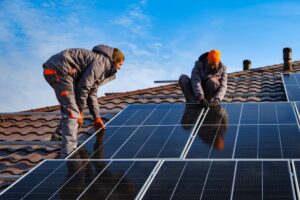Solar panel installation is increasingly becoming popular in the UK due to the rising cost of electricity and the need to reduce carbon emissions.
Installing solar panels in homes and businesses can help reduce energy bills while also contributing to a cleaner environment. In the UK, the government offers incentives to encourage the installation of solar panels, making it an attractive option for many people.
Before installing solar panels in the UK, it is important to understand the process involved. Homeowners must first determine the size of the system they need, which depends on their energy usage and available roof space. They must also ensure that their roof is structurally sound and can support the weight of the solar panels. The installation process involves mounting the panels on the roof, connecting them to an inverter, and then connecting the inverter to the home’s electrical system.
While solar panel installation in the UK can be a significant investment, it can also provide long-term financial benefits. Solar panels can generate electricity for up to 25 years or more, and the government’s Feed-in Tariff scheme allows homeowners to earn money by selling excess energy back to the grid. Additionally, solar panels can increase the value of a property, making it a wise investment for homeowners looking to reduce their carbon footprint while also saving money on their energy bills.
Why Choose Solar Panel Installation?
Solar panel installation has become increasingly popular in the UK in recent years. There are several reasons why homeowners are choosing solar panel installation, including environmental benefits and cost savings.
Environmental Benefits
One of the main reasons why homeowners choose solar panel installation is the environmental benefits. Solar panels use renewable energy from the sun to generate electricity, which means they produce no greenhouse gases or carbon emissions. This makes solar energy a clean and green source of energy.
According to the Energy Saving Trust, an average-size home with a solar panel installation will save over one tonne of carbon dioxide from entering the atmosphere every year. This means that solar panel installation can help reduce the carbon footprint of your home and contribute to a more sustainable future.
Cost Savings
Another reason why homeowners choose solar panel installation is the cost savings. While solar panel installation can be expensive initially, it can help homeowners save money in the long run. Solar panels generate electricity from sunlight, which means that homeowners can reduce their reliance on grid electricity and lower their energy bills.
In addition, the UK government offers financial incentives for homeowners who install solar panels, such as the Smart Export Guarantee (SEG) and the Renewable Heat Incentive (RHI). These incentives can help homeowners offset the cost of solar panel installation and provide additional cost savings over time.
Overall, solar panel installation offers several benefits for homeowners in the UK, including environmental benefits and cost savings. By choosing solar panel installation, homeowners can reduce their carbon footprint and save money on their energy bills.
How to Choose a Solar Panel Installer
When it comes to choosing a solar panel installer in the UK, there are a few key factors to consider. Here are some important things to keep in mind:
Accreditations and Certifications
One of the most important things to look for in a solar panel installer is proper accreditation and certification. Make sure the installer you choose is certified by relevant industry bodies such as the Microgeneration Certification Scheme (MCS) and the Renewable Energy Consumer Code (RECC). These certifications ensure that the installer has met certain standards and will provide high-quality work.
Experience and Reputation
Experience is also an important factor to consider when choosing a solar panel installer. Look for a company that has been in business for a number of years and has a proven track record of successful installations. You can also check the company’s reputation by reading reviews from previous customers. A reputable installer will have plenty of positive reviews and testimonials.
Customer Reviews
Reading customer reviews is a great way to get an idea of the quality of work provided by a solar panel installer. Look for reviews on the company’s website, as well as on independent review sites. Pay attention to comments about the installation process, customer service, and overall satisfaction with the work.
By considering these factors, you can choose a solar panel installer that will provide high-quality work and a positive experience.
The Installation Process
Installing solar panels on a UK property is a straightforward process that typically takes one to three days, depending on the size and complexity of the system. The installation process involves three main stages: Site Survey, Design and Planning, and Installation and Testing.
Site Survey
The first step in the installation process is a site survey. A surveyor will visit the property to assess its suitability for solar panel installation. The surveyor will check the roof’s orientation and angle, shading, and structural integrity. They will also assess the property’s electrical system and energy consumption to determine the size and type of solar panel system needed.
Design and Planning
Once the site survey is complete, the solar panel installer will design a bespoke system that meets the property’s energy needs. The design will include the number and type of solar panels, inverter, and mounting system. The installer will also provide a detailed plan for the installation, including the location of the panels and wiring.
Installation and Testing
With the design and planning complete, the installation team will arrive on site to install the solar panel system. The first step is to erect scaffolding to access the roof safely. The installers will then mount the solar panels on the roof using a specially designed mounting system. They will also install the inverter and connect the panels to the electrical system. Once the installation is complete, the system will be thoroughly tested to ensure it is working correctly.
Overall, the installation process is a relatively simple and hassle-free process that can significantly reduce a property’s energy bills and carbon footprint.
Maintenance and Repairs
Regular Maintenance
Regular maintenance of solar panels is essential to ensure that they continue to function at optimal levels. It is recommended that solar panels are serviced at least once a year to keep them clean and free from debris. This will help to ensure that they are generating as much energy as possible.
During a maintenance visit, a qualified technician will check the panels for any signs of damage or wear and tear. They will also clean the panels to remove any dirt or debris that may have accumulated on them. This will help to ensure that the panels are operating at maximum efficiency and that they are generating as much energy as possible.
Common Repairs
Despite regular maintenance, solar panels may still require repairs from time to time. Some of the most common repairs include:
Inverter Replacement: The inverter is responsible for converting the DC energy produced by the solar panels into AC energy that can be used by your home. If the inverter fails, it will need to be replaced.
Panel Replacement: If a solar panel is damaged or no longer functioning properly, it may need to be replaced.
Connection Issues: Occasionally, solar panels may experience connection issues that prevent them from producing energy. These issues can usually be resolved by a qualified technician.
If you notice that your solar panels are not generating as much energy as they should be, or if you notice any other issues with your system, it is important to contact a qualified technician as soon as possible. They will be able to diagnose the problem and recommend the best course of action.
Conclusion
The UK has seen a significant increase in the number of households installing solar panels in recent years. This growth is due to the numerous benefits that solar panels offer, including reduced energy bills, a constant supply of clean energy, and a positive impact on the environment.
When it comes to choosing the right solar panel, there are several factors to consider, such as efficiency, cost, and durability. The search results provide a good starting point for anyone considering solar panel installation in the UK. The highest-rated solar panel is the Project Solar Evolution Elite 400, while the SunPower Maxeon 3 is the most efficient. JA Solar is the most budget-friendly option.
It is essential to plan the installation process carefully. Homeowners should make space for the solar panel accessories, such as the inverter, cables, and batteries, if desired. They should also ensure that the installation day is convenient and that the scaffolding is erected safely. Homeowners can choose to install the solar panels themselves or hire a professional installer.
Finally, it is worth noting that solar panels are relatively maintenance-free and can last for at least 25 years. However, homeowners will need to replace the inverter within this time. It is essential to carry out regular checks to ensure that the solar panel system is working correctly and efficiently.
Read more:
Solar Panel Installation UK: Everything You Need to Know
















